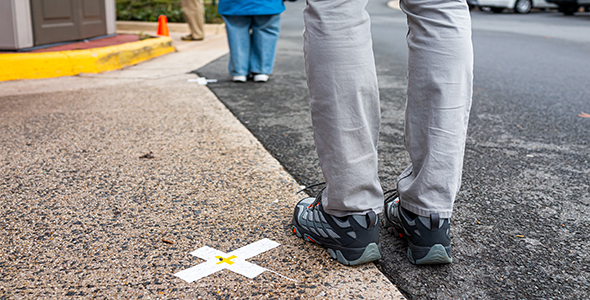By the bioMérieux Connection Editors
As “stay-at-home” orders have begun to relax, people are considering how to reopen businesses and resume some aspects of normal daily life. In some cases, reopening has already begun. However, it’s important to remember that until there is a vaccine, any reductions in social distancing measures could trigger a resurgence in COVID-19 infections.
Accurate data is needed to inform policies and strategies for reopening and combating the virus in order to minimize adverse impacts. An important piece of information that we lack is an accurate picture of the current spread of COVID-19. One way to get that information is to deploy widespread and high-quality serologic antibody testing.
The Role of Antibodies
Antibodies are part of the immune system’s response to pathogenic threats. There are many types of antibodies that help your body fight off infections in various ways, which contribute to your immunity against infections. Immunity means that your body is better-equipped to fight off a particular infection—it does not mean that you are completely protected from getting sick. Because your body produces antibodies in direct response to pathogens, different types of pathogens result in different antibodies. That makes them useful targets for scientists and clinicians trying to determine who has been infected with the SARS-CoV-2 virus.
Why Test for Antibodies
Importantly, serologic antibody tests can only provide accurate results when a patient’s body has had enough time to begin producing antibodies. As such, antibody tests are extremely likely to produce false-negative results early on in an infection. While antibody detection is critical in many ways, clinical experts say that serologic antibody tests should not be used to diagnose an active infection.
Up to 25% of people infected with SARS-CoV-2 have no symptoms, or very mild symptoms, according to the director of the CDC. Serologic antibody tests can confirm suspected COVID-19 cases after the fact, and they can also show who was infected, but was asymptomatic. By finding out who does and does not have antibodies, and tracking that data broadly and within local communities, clinical experts may be able to help make recommendations about when and where we can begin to cautiously reduce social distancing measures. Additionally, researchers say that, “The development of serologic assays that accurately assess prior infection and immunity to SARS-CoV-2 will be essential for epidemiologic studies, ongoing surveillance, vaccine studies, and potentially for risk assessment of healthcare workers.”
However, because antibodies play varied roles, not all types of antibodies provide or are correlated with protective immunity. When you do have protective immunity, it can last as little as a few weeks or for many years. Much is still unknown about the virus and the human body’s response to SARS-CoV-2 infection. Finding out which antibodies provide or correlate with protective immunity, and how long protective immunity lasts, will be critical to inform public health policy, vaccine development, and strategies for infection prevention in hospitals.
Developing & Deploying Antibody Tests
Serologic antibody tests must be developed and deployed appropriately in order to provide accurate data. There are many types of antibodies that tests can detect and ways to detect them. Different types of antibodies serve specific functions in the immune system, and the body manufactures them at varying times and rates. All of those things affect how serologic tests are developed, how they should be used, and what they can tell us epidemiologically and clinically. Inaccurate tests lead to poor data quality, which impedes efforts to fight the virus, compromises the ability to make good recommendations, and puts public health at risk. As such, thorough validation procedures are extremely important.
In general, validation procedures in the United States may be voluntary, completed as part of regulatory requirements, or both. Regulatory requirements vary depending on the type of product and its intended use, as well as the current public health situation. Emergency Use Authorization (EUA) is an abbreviated and temporary approval process that is intended to help make tests and medical devices available in the event of a public health emergency. During the pandemic, EUA has been used to approve a range of tests, devices, and equipment, including molecular COVID-19 tests, which identify and detect the SARS-CoV-2 virus itself.
However, the FDA took the unprecedented step to allow companies to sell COVID-19 antibody tests without an Emergency Use Authorization. To do so, manufacturers had to state that they validated their tests, and patient test reports also had to say that the FDA has not reviewed their assays, noting that they “should not be used as the sole basis to diagnose or exclude SARS-CoV-2 infection or to inform patients of infection status.” But, due to reports of an influx of low-quality tests in the market, the FDA has decided to review the data on currently available tests, and they are requiring developers to request full Emergency Use Authorization.
High-quality tests are critical to properly inform public health policy response to COVID-19, protect healthcare workers, and to provide the data researchers need to develop treatments and vaccines for COVID-19. While it will take time to roll out serologic antibody testing to the population at large, Dr. Anthony Fauci, MD, director of the National Institute of Allergy and Infectious Diseases and a White House Coronavirus Task Force advisor, said that, “[S]erosurveillance is going to play a major role in…a framework for getting back to normal.”
Although it’s hard to know what the new normal will look like, we can be certain that diagnostics will continue to play a major role in supporting public health.
Opinions expressed in this article are not necessarily those of bioMérieux, Inc.



